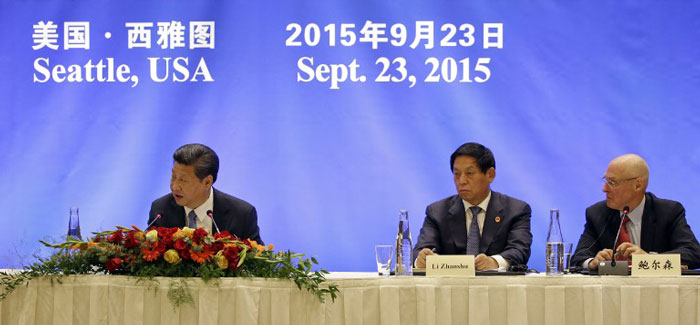
The Paulson Institute today co-hosted a U.S.-China Business Roundtable with 15 U.S. CEOs and 15 Chinese CEOs during the Seattle portion of Chinese President Xi Jinping’s state visit to the United States. President Xi delivered an economic policy speech, highlighting ways that China is working to bolster its economy, advance reforms and strengthen business ties with the United States. Paulson Institute Chairman Henry M. Paulson, Jr., moderated a discussion with the business leaders during the event.
Hosted in partnership with the China Council for the Promotion of International Trade (CCPIT), the roundtable provided an opportunity for U.S. and Chinese business leaders representing a broad range of industries to discuss issues, challenges and opportunities facing the two countries and explore ways to collaborate and strengthen the U.S.-China economic relationship.
In his comments to the business leaders, President Xi stressed China’s commitment to moving forward with economic reforms, as well as the country’s plan to further open up its markets to foreign competition. “Without reform there will be no driving force, without opening up there will be no progress,” Xi said.
Secretary Paulson described trade and economic ties as “the glue that binds our two nations through the ups and downs of the bilateral relationship.”
Addressing President Xi, Paulson said, “Both of our countries are essential to global growth. Yet both countries must carry out structural reforms to move their economies into a more growth-conducive footing for the long term and find ways to address issues such as commercial cyber-theft and climate change.”
“Despite many challenges, there are vastly more areas for cooperation than ever before,” Paulson added. “As the two largest economies in the world, the U.S. and China not only have a shared opportunity to foster sustainable economic growth but also to join together in addressing pressing global problems.”
In his remarks, Xi said China’s economy has “big potential” and that the government will continue to remove barriers to foreign investment. He called for the conclusion of a high-standard Bilateral Investment Treaty between the two countries and noted that there have been improvements in the protection of intellectual property.
The U.S. and Chinese CEOs discussed their interest in increasing investments in each other’s markets, and a desire for increased access for business on both sides. The U.S. CEOs also noted the importance of addressing challenging issues, such as intellectual property protection, common standards and clear, transparent regulations. Both U.S. and Chinese CEOs highlighted opportunities for collaboration on clean technology projects. Chinese CEOs expressed hope that the U.S. will welcome and encourage continued Chinese investment in the United States.
Also participating in the discussion was U.S. Secretary of Commerce Penny Pritzker, who made brief remarks to the attending CEOs.
US-CHINA CEO ROUNDTABLE PARTICIPANTS
U.S. CEOs
Mary Barra, General Motors
Jeffrey Bezos, Amazon
Warren Buffett, Berkshire Hathaway
John Chambers, Cisco Systems, Inc.
Timothy Cook, Apple Inc.
David Cote, Honeywell
Robert Iger, The Walt Disney Company
Ellen Kullman, DuPont
Andrew Liveris, The Dow Chemical Company
Satya Nadella, Microsoft
Indra Nooyi, PepsiCo
Dennis Muilenburg, The Boeing Company
Thomas Pritzker, Hyatt Hotels Corporation
Virginia Rometty, IBM Corporation
Howard Schultz, Starbucks
Host: Henry M. Paulson, Jr., The Paulson Institute
Chinese CEOs
Ma Yun, Alibaba
Lu Guanqiu, Wanxiang
Ma Huateng, Tencent
Yang Yuanqing, Lenovo
Wang Yusuo, ENN Energy Holdings
Ma Zehua, China Ocean Shipping Company (COSCO)
Guan Qing, China State Construction Engineering Corporation (CSCEC)
Wan Long, Shuanghui Group
Tian Guoli, Bank of China
Jiang Jianqing, Industrial and Commercial Bank of China (ICBC)
Pan Gang, Yili Group
Zhang Yaqin, Baidu
Liang Haishan, Haier Group
Wang Jinshu, Yuhuang Chemical Industry Group
Guo Guangchang, Fosun
Host: Jiang Zengwei, China Center for the Promotion of International Trade (CCPIT)



